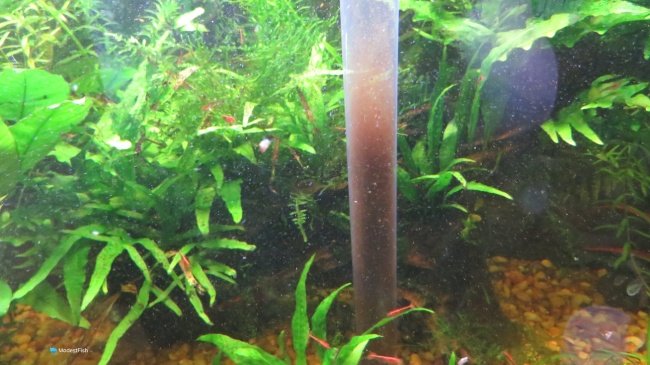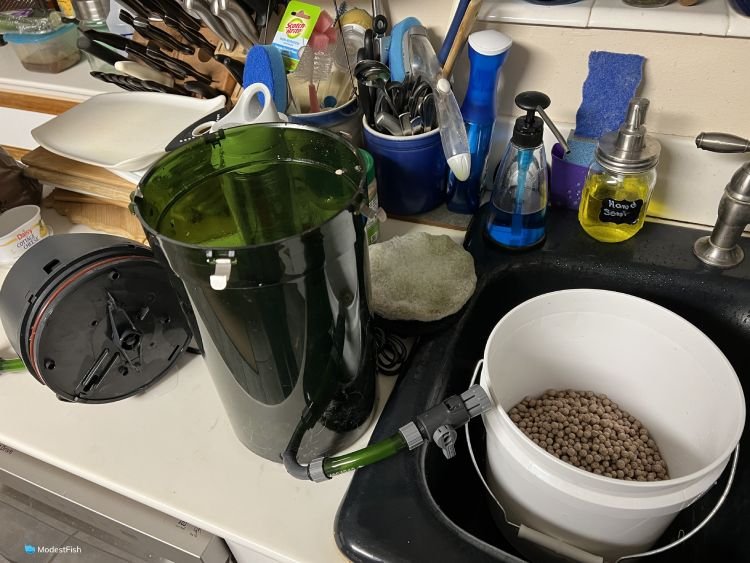Fish tanks start to smell bad when there is an overabundance of bacteria. As bacteria feed they put off gaseous wastes.
That’s a really fancy way to say that the odor you smell is actually bacteria farts.
Mmm… I know, sounds awesome, right?
Just kidding, it’s actually very gross, but very true.
Overpopulation of bacteria doesn’t just make your aquarium smell bad, it also often produces excess ammonia and nitrate, which is unhealthy for fish.
The big question becomes, if there’s a bunch of bacteria in the tank, producing smelly gasses, what are they eating?
Bacteria don’t just pop up from nowhere, they require a food source. Eliminate the food source, and the bacteria levels will go back to normal.
Smelly bacteria in your aquarium could be feeding on:
- Dead fish – sometimes a sick fish will hide, and then die, without you realizing it. Bacteria will quickly breed as they break down the fish.
- Excess fish poop – if solid wastes have been allowed to build up in the tank, it can really start to make things smell gross. The absolute worst is pockets of fish poop trapped under deep sand. Oxygen can only penetrate so deep into a sand bed. Anaerobic bacteria can grow and create super smelly pockets of hydrogen sulfide gas. This stuff stinks to high heaven, it smells like rotten eggs and can be toxic to fish.
- Uneaten food – overfeeding can also really make your tank stink. Decaying fish food is basically rotting fish in your tank. It’s a perfect food for bacteria.
How To Stop Your Fish Tank From Smelling Bad
The best way to get rid of odors from your aquarium is to clear out whatever gross stuff the bacteria is feeding on.
Weekly Water Changes
Changing out around 50% of your water weekly can reduce nitrates, ammonia and other wastes from the water column.
Thorough Gravel Cleaning

It’s important to remove solid wastes from the tank before they can start to rot.
Fish poop sinks to the bottom of the aquarium and settles down into the gravel.
Using a gravel vacuum to suck up all the gunk in your gravel can really help stop your fish tank from smelling.
Push the gravel vacuum tube deep into the substrate and let the plume of poop and uneaten food get pulled out.
Try to get as much of the gravel cleaned as you can each time you change out water.
I’ve seen some sources try to say that you should only vacuum half of your tank each time, or you risk upsetting the balance of your biofilter. I have vacuumed about 90% of my gravel each week, from most of my tanks, for almost two decades, and it has never been an issue.
I recommend getting as much poop out as possible.
Cleaning Sand
Fish poop tends to sit on the top of sand, rather than sinking down into it.
It can also be harder to vacuum sand because it gets sucked up into the gravel vacuum and pushed out of the tank.
You can kink the gravel vacuum hose to slow down the flow and keep sand from escaping. It can be a bit of a pain, but I like doing this because it also stirs up the sand bed.
Conversely, you can wave the lift tube of the gravel vacuum just over the surface of the substrate so it stirs up fish poop that’s laying on top. You can then suck the poop out with the gravel vac.
Once that’s done, you can stir up the sand bed, with your hand or an aquascaping tool, to prevent gas pockets from forming.
Filter Cleaning

Right off the bat, I want to make it clear that you shouldn’t overclean your filters.
You don’t want to kill all of the beneficial bacteria that live on your biomedia.
Things like ceramic media, sintered glass and bio balls just need to be rinsed in dechlorinated water to get algae off the surface, that’s it!
And sponge filters just need to be squeezed out in a bucket of dechlorinated water. Don’t ever try to deep clean biomedia; you’ll destroy the beneficial bacteria.
It’s the mechanical media that needs to really be cleaned. That’s where all the fish poop and slimy gunk gets trapped.
I often take mechanical media outside and spray it with the garden hose. Rinsing it under the bathtub faucet also works well.
Getting rid of solid wastes trapped in the filter is just a good idea in general. I usually clean out my filters once a month. This can go a long way towards improving the smell of your aquarium.
Stop Overfeeding
Overfeeding is one of the biggest problems that plagues aquariums. It’s fun to feed your fish. It’s one of the highlights of my day when I walk around and feed everybody.
But, it can be easy to accidentally feed your fish more than they need.
Here are some tips to control feeding:
- Stay and watch your fish eat – Make sure that all the food you put in the tank is getting eaten. Don’t just dump food in and walk away.
- Slow down the feeding – Often, you should add food a little at a time, instead of just dumping the entire daily ration in at once. Giving a little at a time helps keep food from sinking faster than fish can eat it.
- Keep feeding sessions short – Only feed fish as much food as they can eat in about a minute. You can extend it to 2-3 minutes for fish that eat really slowly, like Bettas. But, all the little quick guys, like guppies, a minute is plenty of time for them to get all the food they need.
- Don’t believe their lies – Fish will always act like they’re starving; don’t believe it. A fish’s stomach is only about as big as its eye. They only need to eat small portions, once or twice a day.
- Promptly remove uneaten food – Use a net or gravel vacuum to get rid of uneaten food. A few pieces here or there are no big deal, but if a whole half a teaspoon of food sinks to the bottom, get it out of there!
- Add bottom feeders – Adding in bottom feeding fish, shrimp or snails is a great way to prevent food from rotting in the tank. The bottom feeders will come along and pick up the scraps that get past top-dwelling fish. I especially like otocinclus catfish, loaches, corydoras and various kinds of shrimp. It’s nice to have a cleanup crew and most bottom feeders are interesting additions to a community tank.
Final Thoughts
Sometimes a fish tank can get smelly if it has a bacterial population boom. A tank can get out of balance from things like uneaten food, a dead fish or a buildup of fish poop.
Getting on a good aquarium maintenance schedule is the best way to combat fish tank odor.
Clearing out wastes and uneaten food will help keep bacterial growth in check. Less bacteria means less stinky bacteria farts, which means a better smelling fish tank!
I hope you find this article helpful.
I wish you and your fish the very best!
